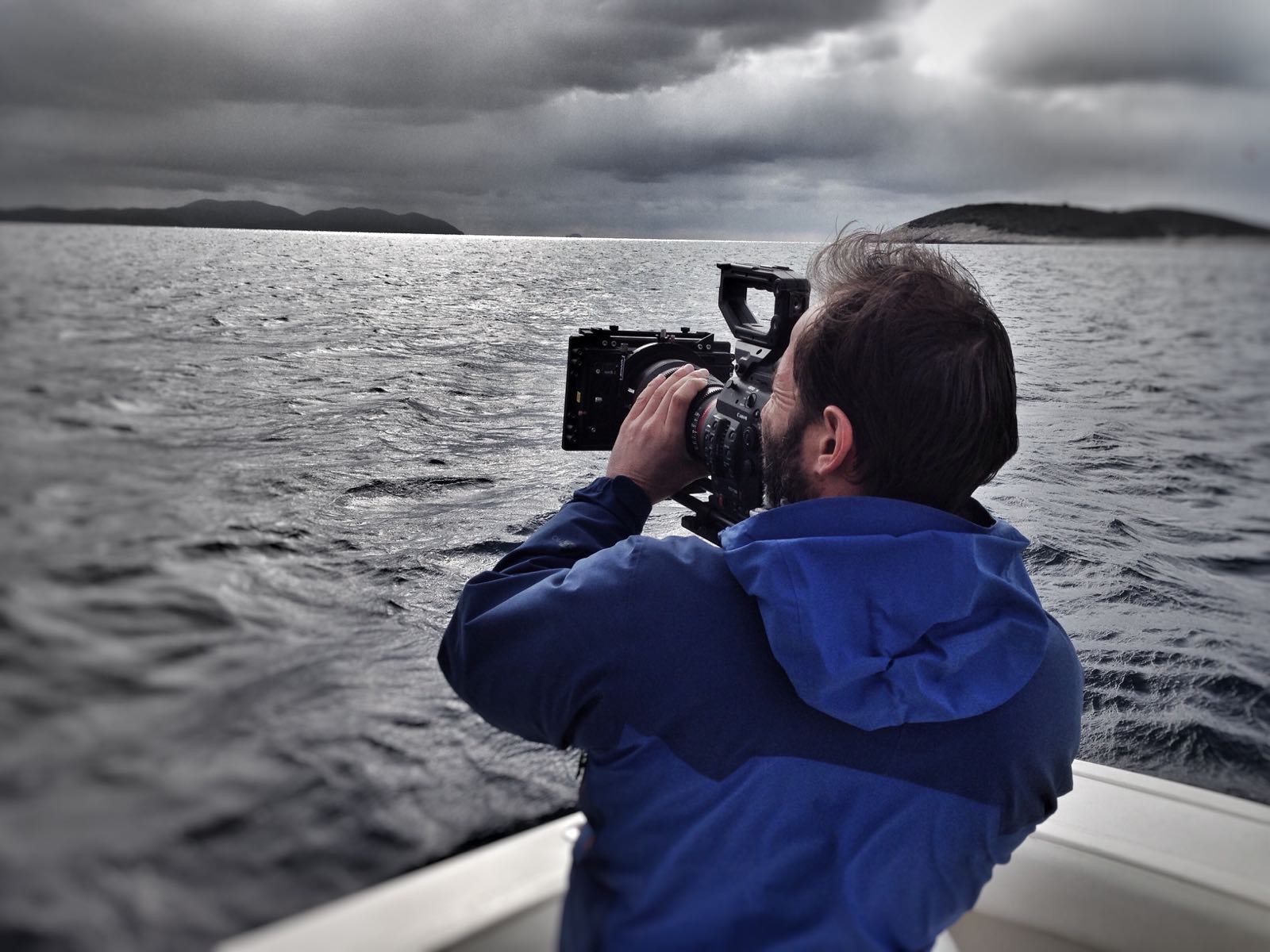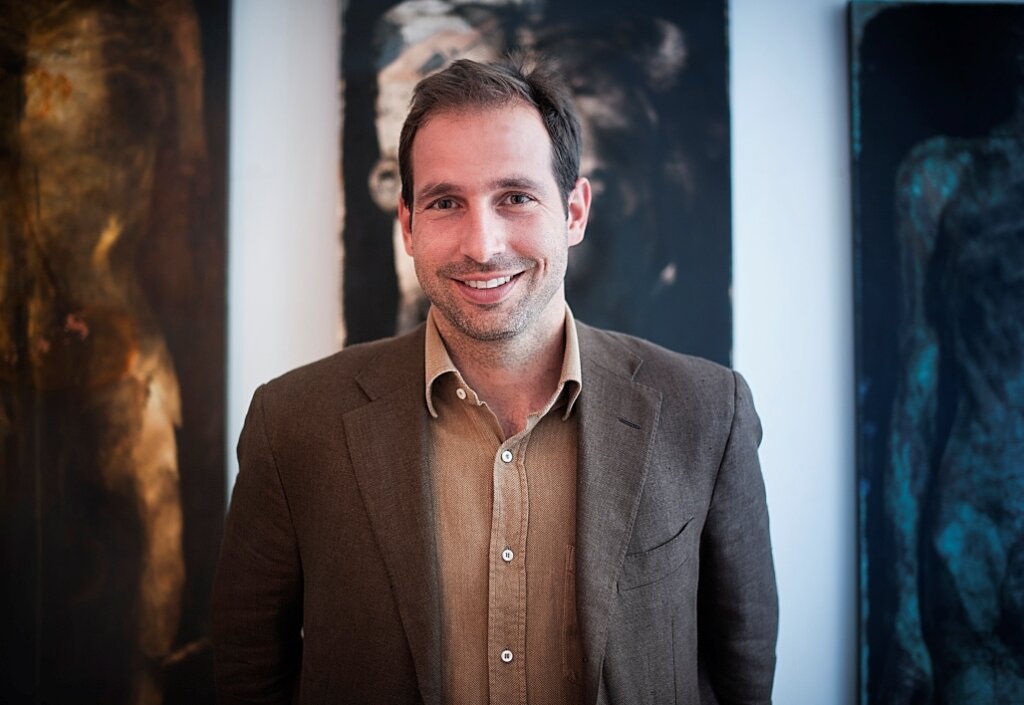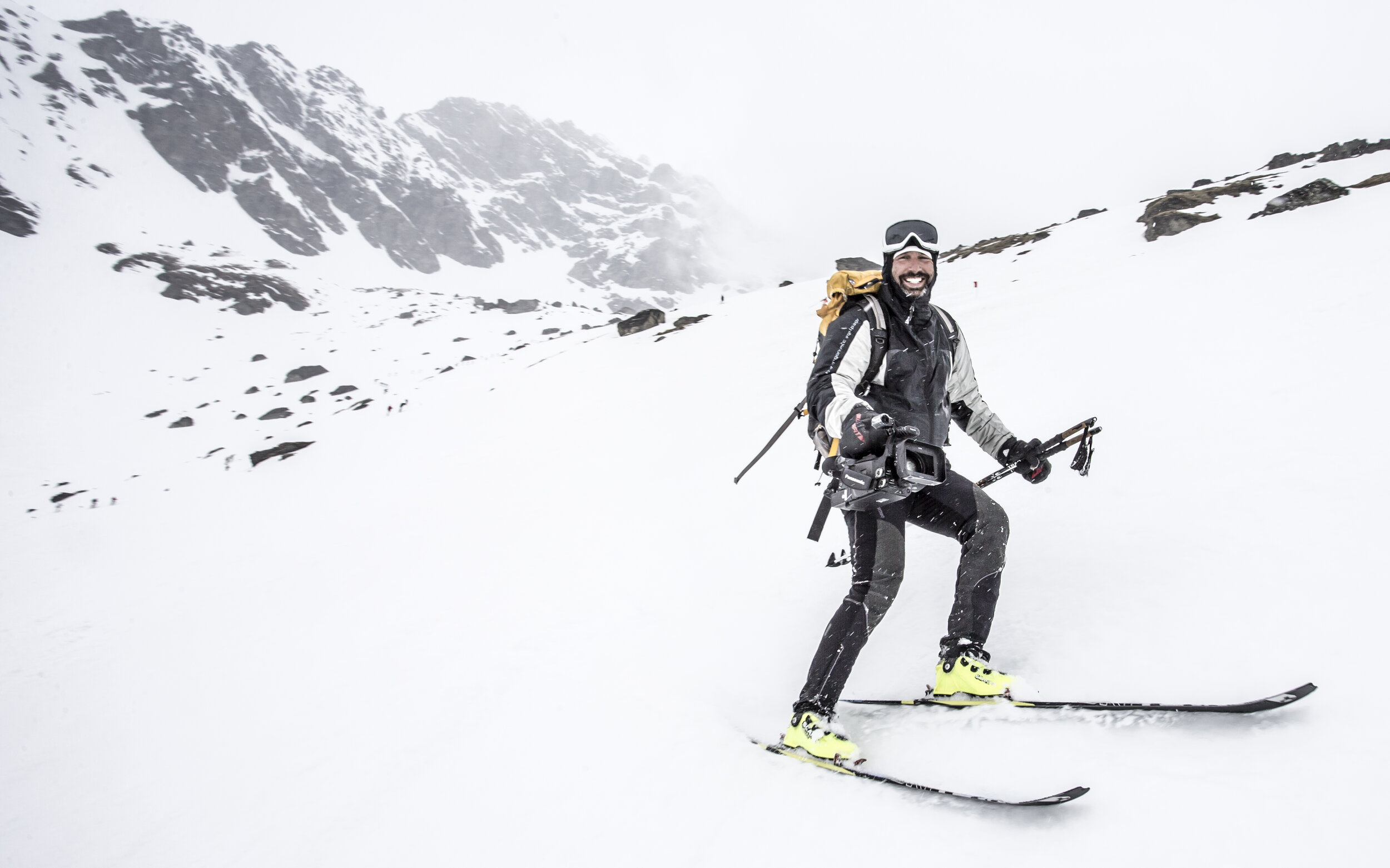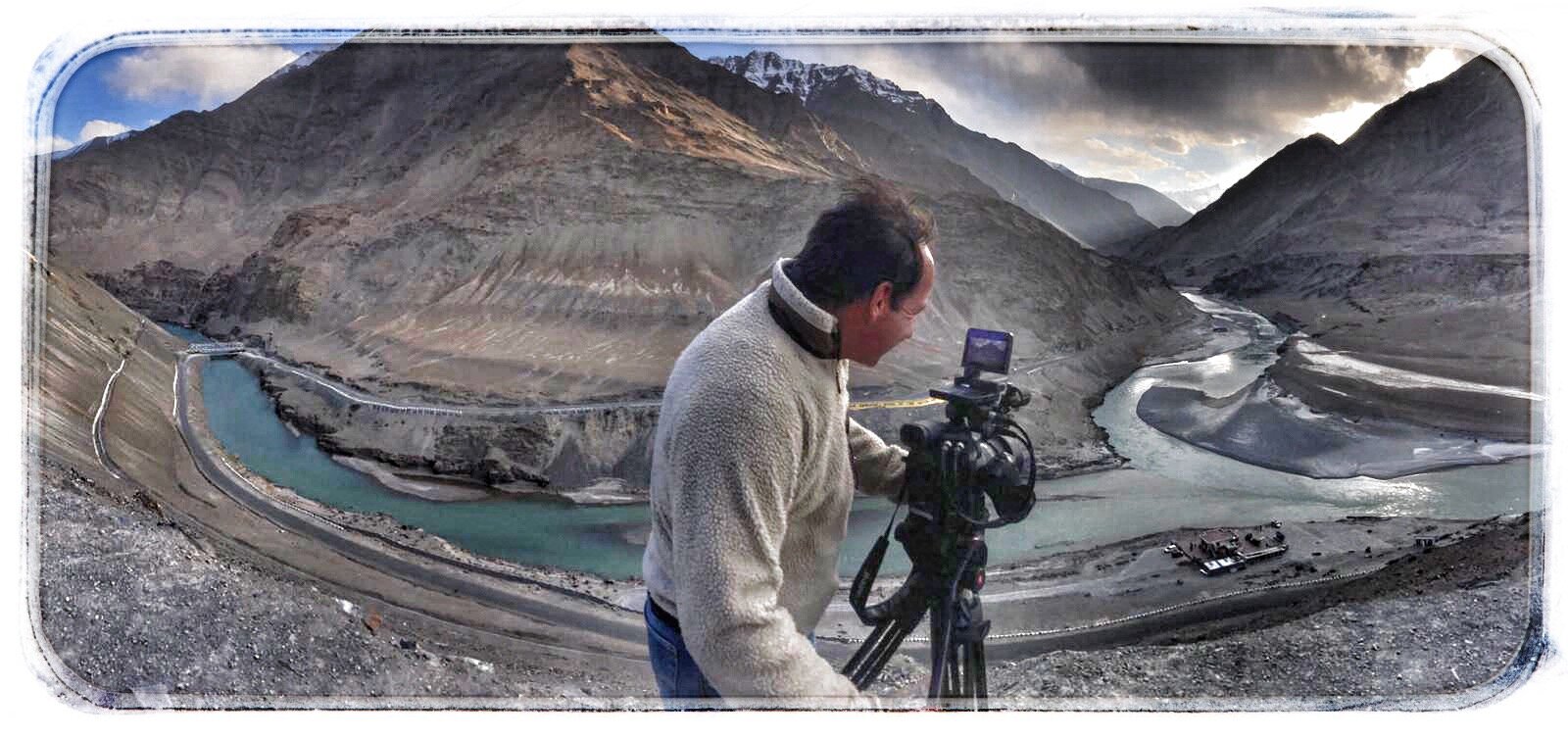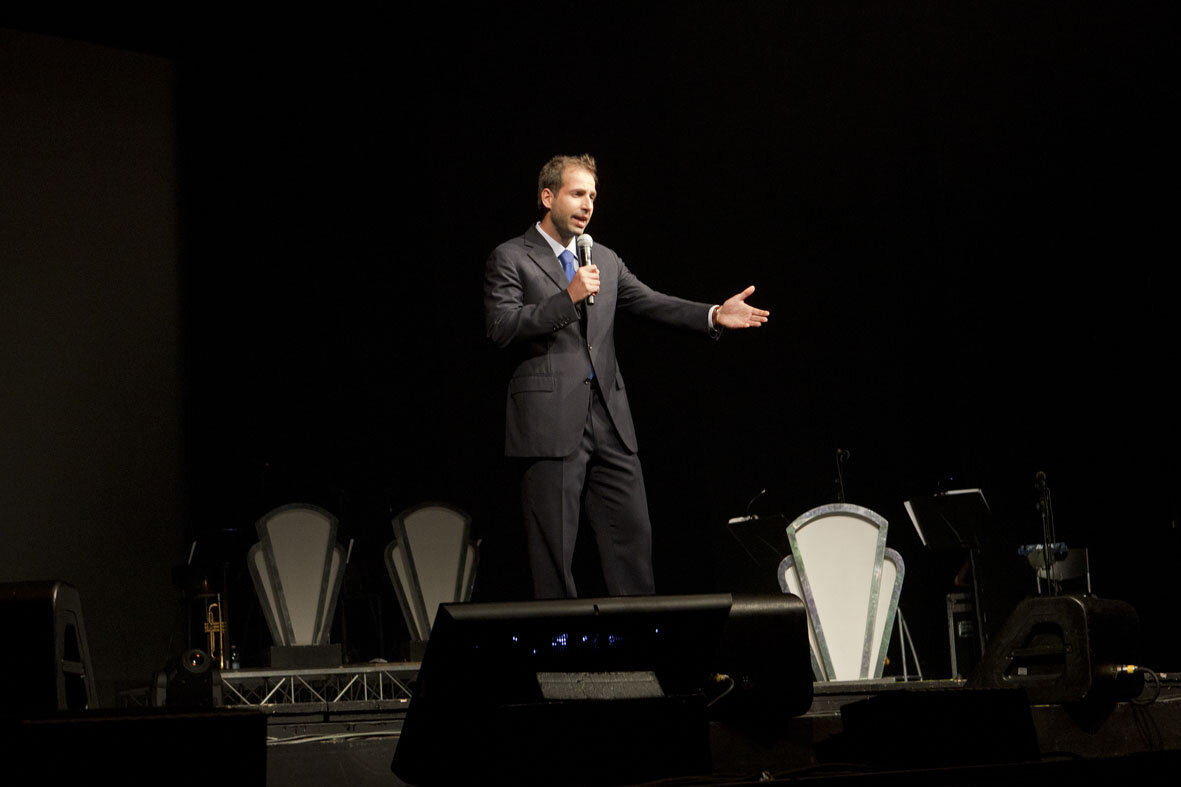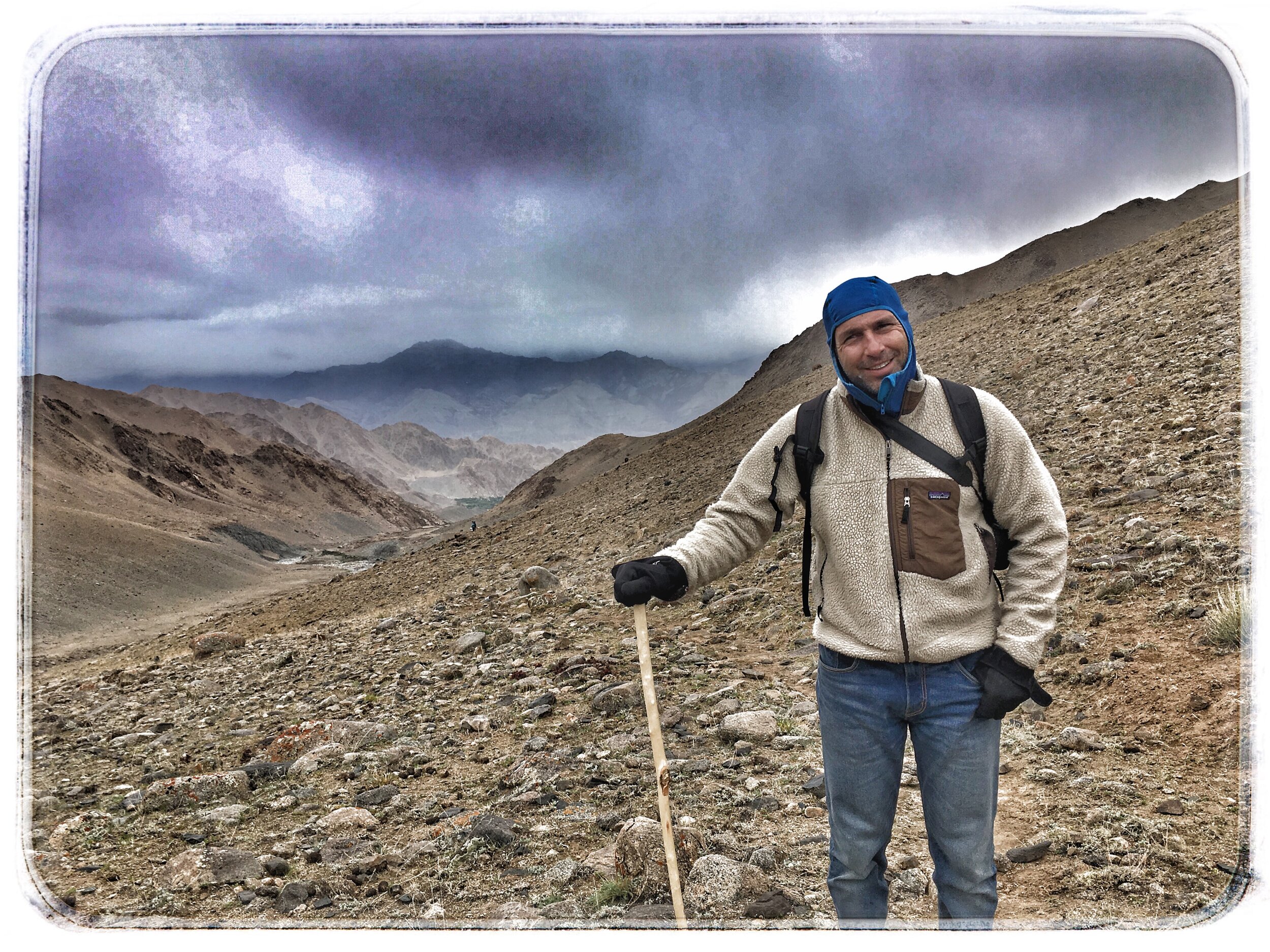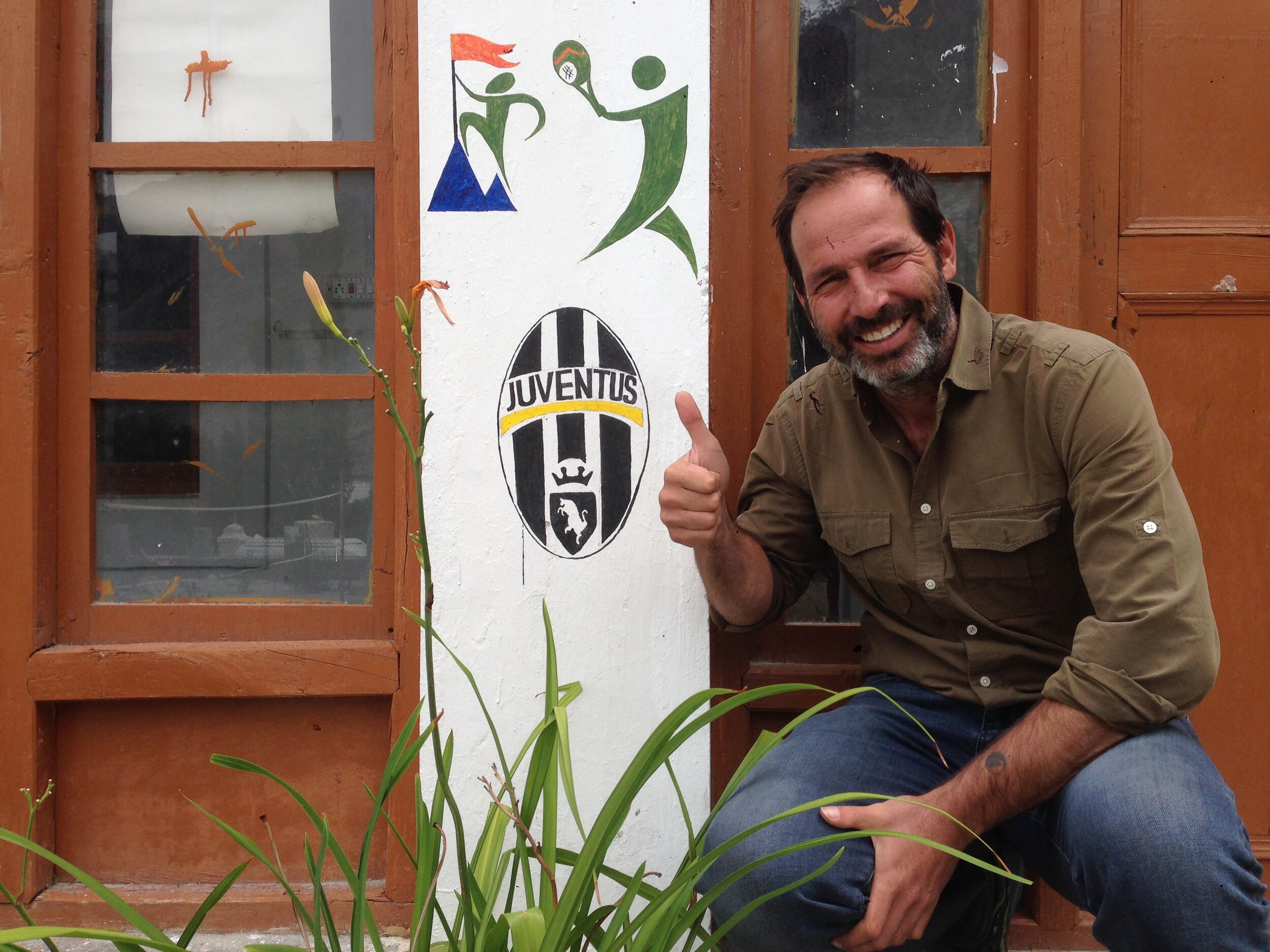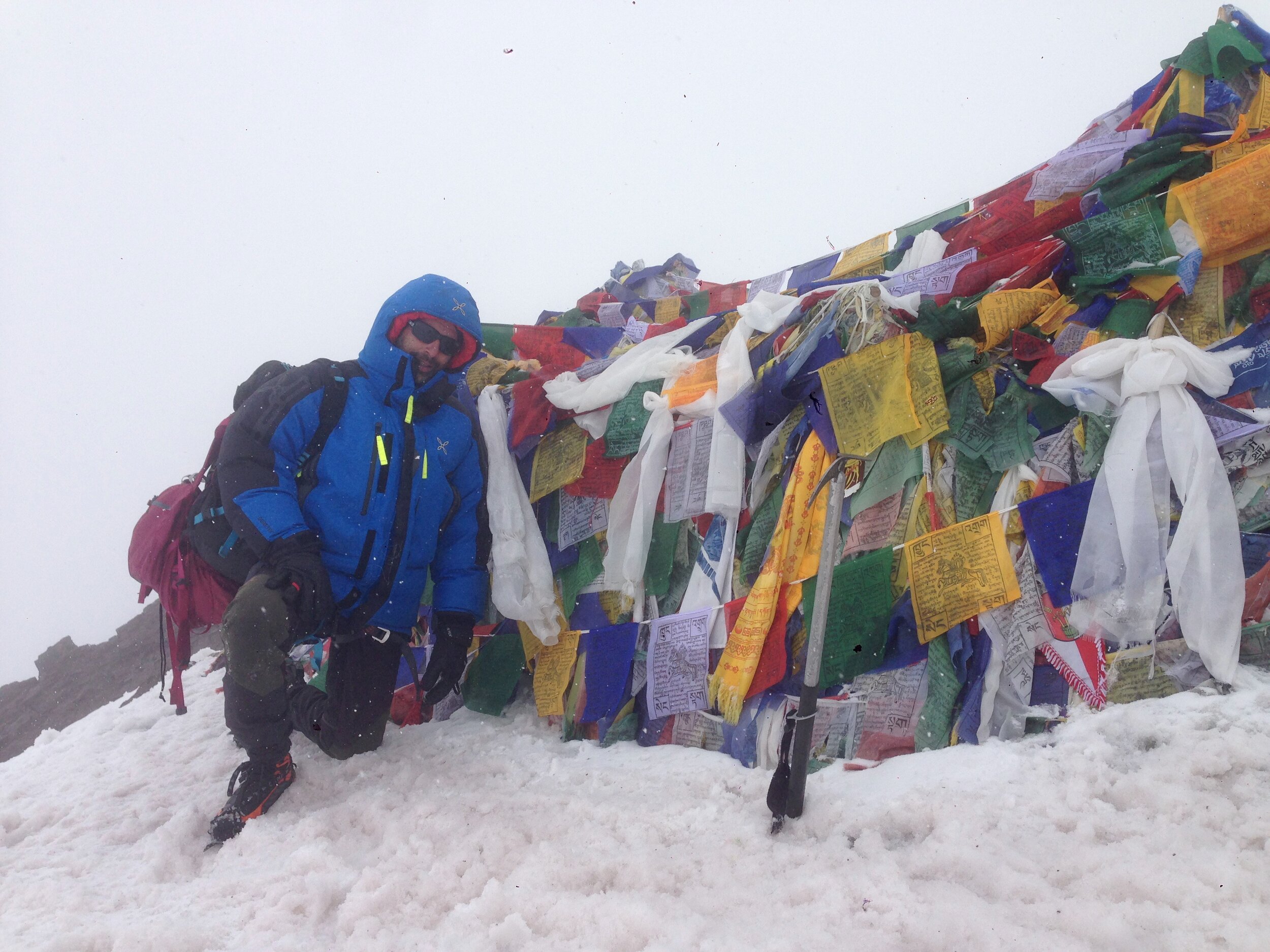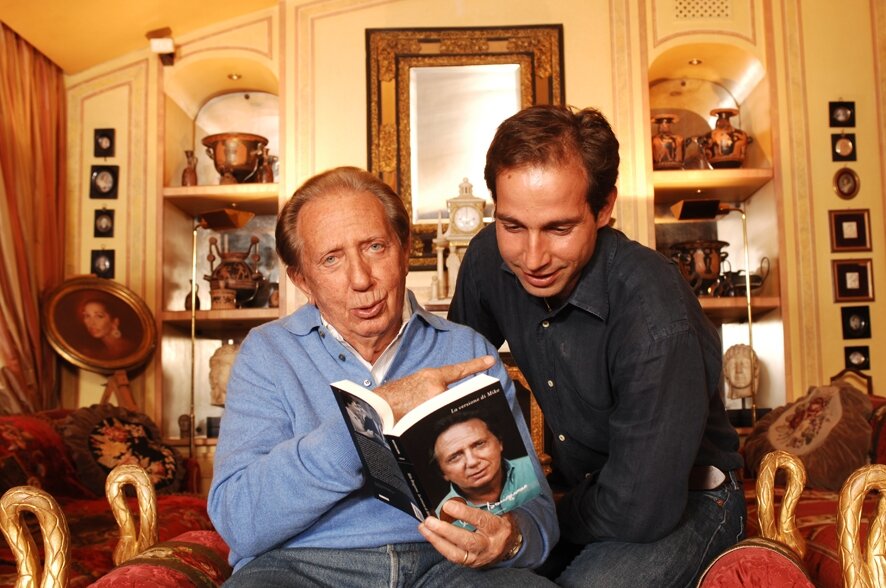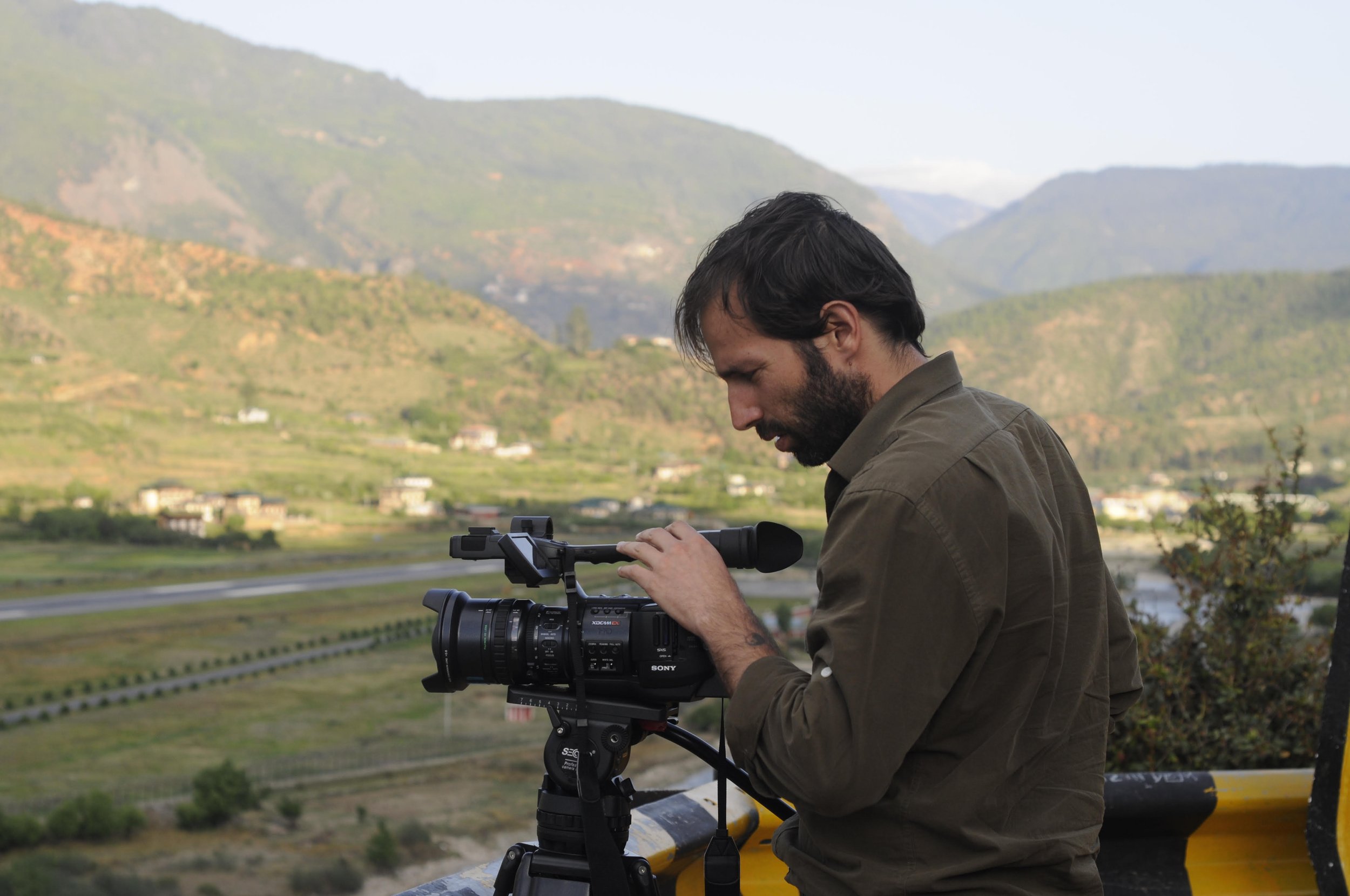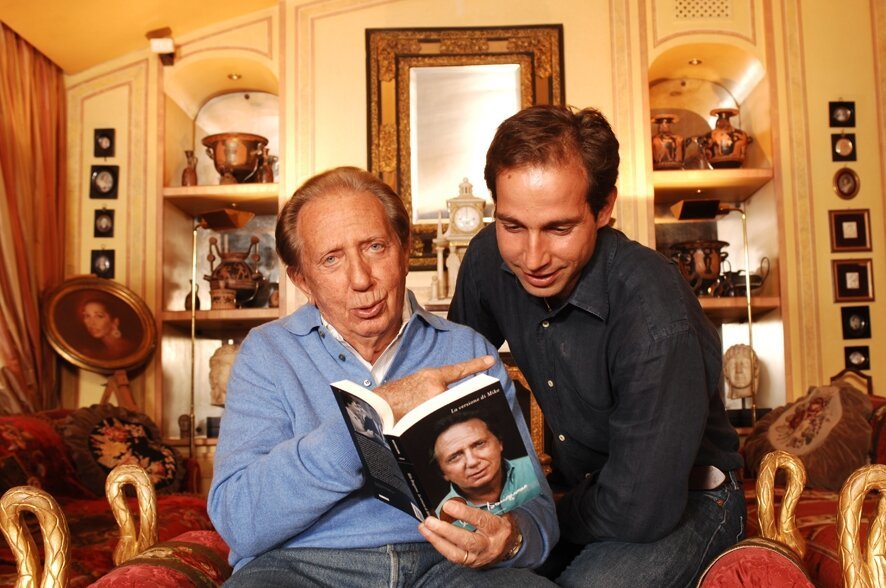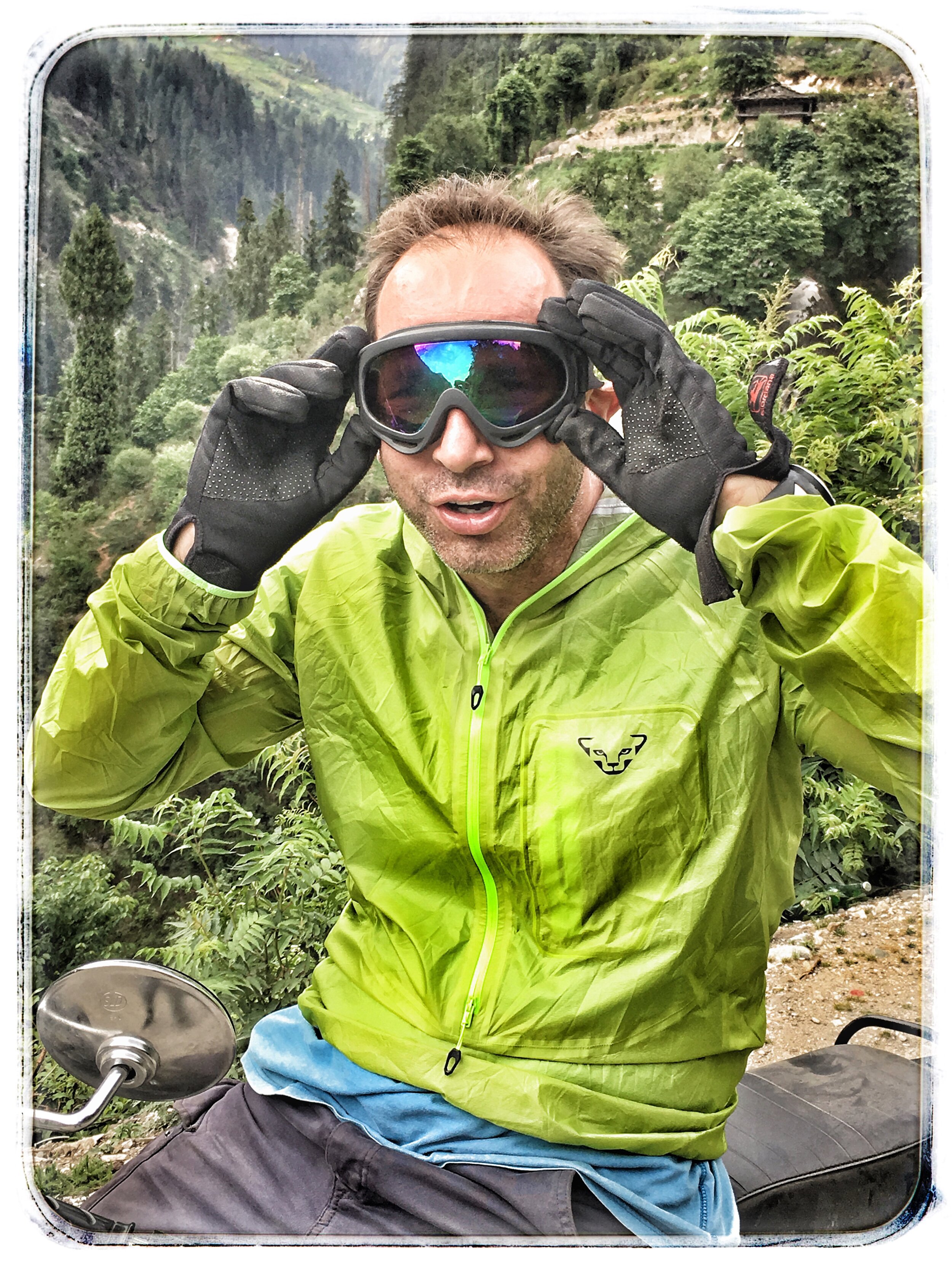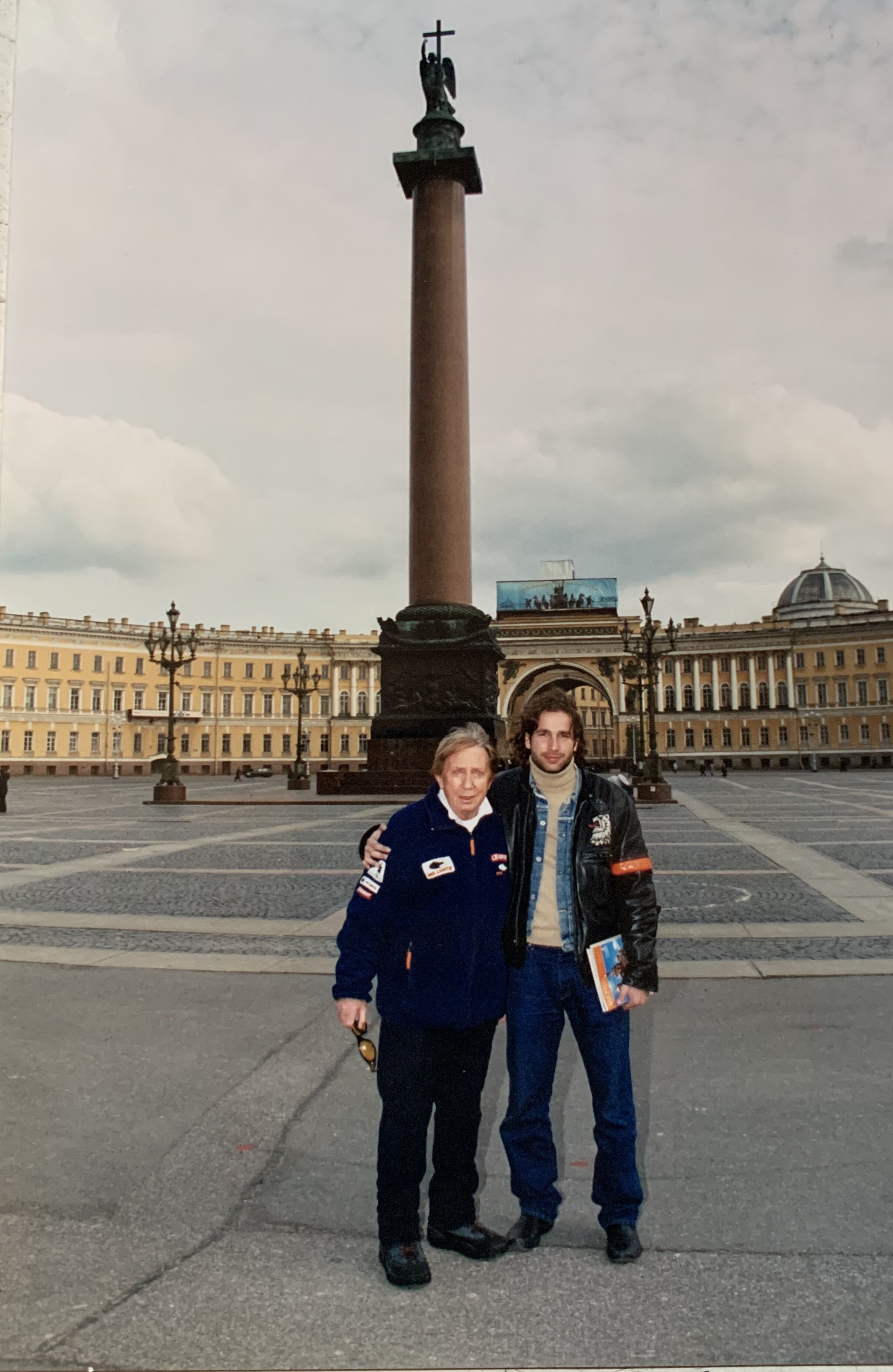{ENG} Nicolò Bongiorno is a director, screenwriter and producer born in Milan on April 4, 1976.
His works in the field of documentary and film research originate from his personal connection with those dimensions that in the human soul belong to the unknown and the unexplored. On the edge of a dreamlike and imaginative precipice that since the dawn of time has outlined man's propensity to explore what remains hidden from his gaze, the analyzes conducted by Nicolò in his works aim to capture that infinite and boundless space where man encounters nature in its most hostile and inhospitable forms, but from whose bond a motion is born that can push him towards unexplored areas of the world and of the self.
Second child of the legendary Italian American television host Mike Bongiorno, already at a young age Nicolò shows a predilection and a heartfelt passion for the world of entertainment. After some high school amateur performances, he makes his debut as director and producer of Godot’s Bop, a theatrical self adaptation loosely based on Samuel Beckett’s opera Waiting for Godot that is staged both at the Arsenale Theater in Milan and at the Fringe Festival in Edinburgh.
After completing his studies at the International School of Milan, Nicolò works as assistant to the editorial directors of Mediaset networks, at the same time gaining international experience engaging in soap-opera television work in Buenos Aires, where he is sent to follow the telenovela Con alma de tango as a production delegate, and prestigious film experiences, such as the production assistance he makes for Woody Allen's Mighty Aphrodite. Driven later by the desire to gain new professional experiences away from home, after collaborations with Wim Wenders and Dario Argento, he moves to the United States, the country of his ancestors, where he begins his film and acting studies at the New York University and the The New School.
At the age of twenty, together with his parents and older brother Michele Pietro Filippo, he is founder of the family production house Bongiorno Productions; continuing at the same time to pursue his passion for the art, he then collaborates with Ruggero Gabbai on the documentary Memoria, of which he takes care of the direction of photography and which is broadcasted by Rai Due and presented at the Berlin International Film Festival, and the films Cici Daci Dom and Febbre Rossa for which he plays the roles of assistant director and director of photography respectively.
All of these precocious experiences in the fields of production, editing and photography gained within the family company Bongiorno Productions and in other productions, such as the one with the Cinemovel in Mozambique, Mozambico dove va il cinema, reveal for Nicolò a unique opportunity to to hone his directing skills and knowledge of the dynamics of film and television sets, overall kickstarting his career as a director.
His debut as a film director sees him directing a short film, Windows, and then the television documentary Risvegli. One of the works to which Nicolò remains mostly attached, however, is Viaggio Verso Casa, a film directed in collaboration with Ruggero Gabbai and dedicated to the actress Giulietta Masina who had been the young director's godmother. The documentary turns out to be an intimate travel diary, a journey as a quest of the places of memory, with the exceptional participation in the guise of a modern Virgil his friend Tonino Guerra (one of the most important screenwriters in the history of Italian and European cinema of the last half century) who accompanies Nicolò on a long journey from Turin, to Umbria, from the Sienese countryside, to the Sibillini mountains, but also to Rome, Bivongi, Calabria to finally reach Mezzojuso in Sicily, the land of origin of his ancestors.
In the early 2000s he produces and directs a "docu-drama" entitled Sidewalk which, set in New York, provides a glimpse into the life of the protagonists of the streets of the Big Apple. A humanity made up of artists, prostitutes, taxi drivers and policemen, all at the center of stories on the verge of survival, but also of creativity where despair and hope alternate in a continuous circle. In the field of television productions, among the most important works to which Nicolò dedicates himself is the production work on the American program Gordon's Doorknock Dinners for the Food Network channel and the fictional films Gli occhi dell’amore, directed by Giulio Base starring Micaela Ramazzotti, and Rocco, with Barbara d'Urso and Antonello Fassari, of which Nicolò is director.
In 2003 he directs one of his most important documentary works in the field of historiography, Esodo which is broadcasted on the History Channel and in the Italian Chamber of Deputies on the occasion of the first anniversary day of the National Memory of the Julian Dalmatian exiles. At the center of the work is the story of the tragedy of the Foibe (sinkholes) and of the hundreds of thousands of people who in the 1940s were forced to leave their native lands because of the war. The film is recognized as the first documentary work dedicated to the analysis of one of the darkest events in Italian history and also receives recognition from the President of the Republic himself. The film arouses a strong impact also within the media and journalistic circles, so much so that in an article in “Corriere della Sera” by Aldo Grasso it is described how it managed "to restore the dimension of the tragic, to break the silence that for years has covered a shame, to question the political responsibilities of a mass sacrifice”.
Also from the same period is the creation and direction of the video-art project Era la mia casa, a work destined for the Milan-Auschwitz exhibition 30.01.1944, RSHA convoy in Palazzo della Ragione in Milan, starring in the role of herself the life senator Liliana Segre. The years of experience within the family company Bongiorno Productions allow Nicolò to develop deep skills and sensitivity that find expression in the foundation of his own production company Buendia Film whose main mission is research and development of innovative formats (including The King for MTV with Alessandro Cattelan) and the production of documentary and fiction film projects. In those same years, he scripts together with Anna Samueli for RTI a historical television drama dedicated to the life of Giuseppe Mazzini.
In addition to his activity as a director, Nicolò also merges his historical interests into a profound family genealogical research, and is also known as the author and personal curator of his father's autobiography, La versione di Mike, co-written with his father and published by Mondadori. The book achieves enormous success and within a few months makes record sales among Italian biographies and is subsequently re-published also within the Oscar Mondadori series.
2007 is the year in which Nicolò completes a project begun in 2004, a documentary with a strong biographical character that he writes and directs. This is Rol - Un mondo dietro al mondo, a docu-film focused on the life of Gustavo Adolfo Rol, philosopher/shaman and scholar of the metaphysical sciences, who went down in history as one of the most enigmatic characters of the 20th century. Suspended between biography, reportage and reconstruction, the work builds a path that leads the viewer ever closer to the heart of what Rol's life and thought have meant for all those who have known him or have come into contact with him, exposing a profound research on the nature of his faculties.
Following the International sub-prime economic crisis of those same years, Nicolò is hired by Rai Cinema as author and director of the documentary Nuova Povertà, for which he conducts extensive research in places such as the United States, Bhutan and Iceland in order to build a reflection on the relationship between Gross National Happiness GNH) and Gross Domestic Product GDP). In the same period he directs the documentary Piazza San Marco, Venice and acts in the documentary Le Sorelle Diabolike, directed by Andrea Bettinetti.
In 2010, one year after the tragic and sudden death of Mike, the Bongiorno family sets up the Mike Bongiorno Foundation, an institution committed to social assistance, education and technological development that initially sees Nicolò as project director and later president. By virtue of his role, central to the life of the foundation, he hosts the television program “Buon lavoro! a program created with the aim of providing help to young people aged 18 to 35 in the search for a job, conceived by the Mike Bongiorno Foundation and created by Bongiorno Productions for the Sky Uno channel.
In 2014 Nicolò gives life to a new long term project aimed at experimenting with reflective and performative insights in the field of nature and exploration, starting the shoot of Cervino - La montagna del mondo, the first chapter of the trilogy "3 Human Adventures", dedicated precisely to the theme of exploration in the human realm. The film sees Nicolò engaging in the historical narrative of the conquest of the Cervino/Matterhorn mountain in 1865, the archival research of literary sources and finally the alpinistic approach that Nicolò himself interprets along the impervious ridges of the mountain. The film, presented in 2015 at the Cervino Cinemountain, obtains the audience award and in the same year triumphs at other film festivals in the mountain film category.
Subsequently he starts the production of the second chapter of his trilogy, The Lions of Lissa, a documentary that traces the events that took place during the legendary naval Battle of Lissa fought in 1866 between the fleets of the Austrian Empire and that of the Kingdom of Italy. In this marine-flavored adventure, where the sound of taut rope intertwines with the roar of the waves cut by the boats, every historical study and every research conducted by the director converges in the cathartic immersion that Nicolò himself performs together with a team of international underwater explorers, and that leads them to the discovery of the wreck of the Re d’Italia, the flagship battleship sunk during the battle and which today lies motionless and silent at a depth of more than a hundred meters. The documentary is a huge success both in national and international archeological and underwater film contexts and obtains the maximum recognition at the Firenze Archeofilm amongst other festivals.
At the same time, in 2017, Nicolò starts working on another documentary project whose realization will see him engaged in an adventurous production for three years. This is Songs of the Water Spirits, a work that, born from the director's sensitivity towards certain ecological and cultural themes, deals with the effects of globalization on the territories of Ladakh, a region in northern India, but also focuses on the innovative responses and planning by its own inhabitants. In Songs of the Water Spirits Nicolò tries to tell the challenge of a "laboratory" society nestled between high-altitude deserts and some of the highest and most spectacular peaks in the world, overwhelmed by the impact of climate change, and in search of a "new way” to an “ancient future". Ecology, cultural identity, sustainable development and ecolinguistics, these are the pillars on which the film stands, and at the end of production in late 2020 the film is successfully received within various festivals and reviews in which it is presented. Among the numerous awards that the documentary has won in that same year are the special mention assigned by the jury at the Visioni dal mondo festival in Milan and the victory at the Terraviva Film Festival. The film also collects successes in 2021, winning the MUSE Videonatura award at the 69th Trento Film Festival. In the summer of the same year the film is also presented at the Cervino Cinemountain where it obtains the audience award and at the Varese Archeofilm capturing the recognition of both the technical jury and the audience award, while in the autumn it obtains international awards in the field of anthropology and environmental communication in the United States and other European festivals.
{ITA}Nicolò Bongiorno è un regista, sceneggiatore e produttore nato a Milano il 4 aprile 1976.
I suoi lavori nel campo della ricerca documentaristica e cinematografica trovano origine in un suo personale legame con quelle dimensioni che nell’animo umano appartengono allo sconosciuto e all’inesplorato. Sul bordo di un precipizio onirico ed immaginifico che fin dagli albori dei tempi delinea la propensione dell’uomo all’esplorazione di ciò che rimane celato al proprio sguardo, le analisi condotte da Nicolò nelle sue opere si prefiggono di cogliere quello spazio infinito e senza confini dove l’uomo incontra la natura nelle sue forme più ostili ed inospitali, ma dal cui legame si origina un moto in grado di spingerlo verso le zone inesplorate del mondo e del sé.
Secondogenito del celebre presentatore televisivo Mike Bongiorno, già in giovane età manifesta una predilezione ed un sentito trasporto verso il mondo dello spettacolo. Dopo alcune esibizioni dilettantistiche effettua il suo debutto come regista e produttore di Godot’s Bop, un adattamento teatrale liberamente ispirato all’opera Aspettando Godot di Samuel Beckett che viene messo in scena sia al Teatro Arsenale di Milano che al Fringe Festival di Edimburgo.
Dopo aver completato il suo percorso di studio presso l’International School of Milan, Nicolò lavora come assistente dei direttori di alcune reti Mediaset, maturando contemporaneamente esperienze dal respiro internazionale che lo vedono impegnato sia in lavori televisivi a Buenos Aires, dove era stato inviato a seguire la telenovela Con alma de tango in qualità di delegato di produzione, che cinematografici, come ad esempio l’assistenza alla produzione che realizza per il film Mighty Aphrodite di Woody Allen. Spinto in seguito dal desiderio di maturare nuove esperienze professionali lontano da casa, dopo alcune prestigiose collaborazioni con Wim Wenders e Dario Argento, si trasferisce negli Stati Uniti, paese dei suoi antenati, dove intraprende gli studi di cinema presso la New York University e la New School University di New York.
All’età di vent’anni insieme ai genitori e al fratello maggiore Michele Pietro Filippo dà vita alla casa di produzione di famiglia Bongiorno Productions; continuando parallelamente a portare avanti la sua passione lavorativa collabora poi con Ruggero Gabbai al documentario Memoria di cui cura la fotografia e che viene sia trasmesso da Rai Due che presentato al Festival Internazionale del Cinema di Berlino e ai film Cici Daci Dom e Febbre Rossa per i quali svolge rispettivamente i ruoli di assistente alla regia e direttore della fotografia.
Ognuna di queste esperienze nei campi della produzione, dell’editing e della fotografia maturate tanto in seno alla Bongiorno Productions quanto ad altre produzioni, come quella con il Cinemovel in Mozambico, Mozambico dove va il cinema, si rivela per Nicolò un’opportunità unica per affinare le proprie capacità registiche e di conoscenza delle dinamiche dei set cinematografici e televisivi che nel loro insieme avviano la sua carriera da regista.
Il suo esordio alla regia cinematografica lo vede dirigere prima il cortometraggio Windows e successivamente il documentario televisivo Risvegli. Uno dei lavori a cui Nicolò rimane tuttavia più legato è Viaggio verso casa, un film diretto in collaborazione con Ruggero Gabbai e dedicato all’attrice Giulietta Masina che era stata madrina di battesimo del giovane regista. L’intero documentario si rivela essere un diario di viaggio, un percorso alla ricerca dei luoghi della memoria che vede nelle vesti di moderno Virgilio l’amico Tonino Guerra (sceneggiatore fra i più importanti della storia del cinema italiano ed europeo dell’ultimo mezzo secolo) che accompagna Nicolò in un lungo viaggio da Torino, all’Umbria, dalla campagna senese, ai monti Sibillini, ma anche a Roma, a Bivongi, in Calabria per giungere infine a Mezzojuso in Sicilia, terra di origine dei suoi antenati.
Nei primi anni Duemila realizza e dirige un “docu-drama” intitolato Sidewalk che, ambientato a New York, fornisce uno spaccato della vita dei protagonisti delle strade della Grande Mela. Un’umanità fatta di artisti, prostitute, taxisti e vigili, tutti al centro di storie al limite della sopravvivenza, ma anche della creatività dove disperazione e speranza si alternano in un circolo continuo. Nel campo delle realizzazioni televisive tra le opere di maggior rilievo a cui Nicolò si dedica vi sono la produzione della trasmissione statunitense Gordon’s Doorknock Dinners per il canale Food Network e i film fiction Gli occhi dell’amore, diretto da Giulio Base e con Micaela Ramazzotti del quale cura la produzione e Rocco, con Barbara d’Urso e Antonello Fassari, che invece lo vede direttamente alla regia.
Nel 2003 dirige uno dei suoi più importanti lavori documentaristici in ambito storiografico, Esodo che verrà trasmesso su History Channel e alla Camera dei Deputati in occasione della prima giornata della Memoria Nazionale in ricordo degli esuli giuliano dalmati. Al centro dell’opera vi è il racconto del dramma delle foibe e di tutte quelle centinaia di migliaia di persone che negli anni Quaranta furono obbligate a lasciare le proprie terre natie. Il documentario viene riconosciuto come prima opera di stampo documentaristico dedicata all’analisi di una delle più oscure vicende della storia italiana e riceve inoltre il riconoscimento da parte del presidente della Repubblica stesso. Il film suscita un forte impatto anche all’interno degli ambienti mediatici e giornalistici tanto che in un articolo del Corriere della Sera ad opera di Aldo Grasso viene descritto come esso sia riuscito «a restituire la dimensione del tragico, a rompere il silenzio che per anni ha coperto una vergogna, a interrogarsi sulle responsabilità politiche di un sacrificio di massa».
Dello stesso periodo sono inoltre la realizzazione e la direzione del progetto di video-arte Era la mia casa, un’opera destinata alla mostra Milano-Auschwitz 30.01.1944, convoglio RSHA a Palazzo della Ragione a Milano e che vede tra i suoi protagonisti la senatrice a vita Liliana Segre. Gli anni della Bongiorno Productions permettono a Nicolò di maturare profonde competenze e sensibilità che trovano espressione nella fondazione della sua casa di produzione Buendia Film la cui mission principale è la ricerca, lo sviluppo di format innovativi (tra cui The King per MTV con Alessandro Cattelan) e la produzione di progetti cinematografici di documentaristica e di narrativa. In quegli stessi anni, poi, insieme ad Anna Samueli scrive la sceneggiatura per RTI di una fiction televisiva storica dedicata alla vita di Giuseppe Mazzini.
Oltre all'attività di regista Nicolò fa confluire i suoi interessi storici anche in una profonda ricerca genealogica famigliare, ed è noto anche in quanto autore e curatore personale dell'autobiografia del padre, La versione di Mike, insieme al quale la realizza ed edita dalla casa editrice Mondadori. Il libro ottiene un enorme successo e registra nell’arco di pochi mesi il record di vendite tra le biografie italiane venendo successivamente ripubblicato anche all’interno della collana degli Oscar Mondadori.
Il 2007 è l’anno in cui Nicolò porta a compimento un progetto iniziato nel 2004, un documentario dal forte carattere biografico che lo vede autore e regista. Si tratta di Rol - Un Mondo dietro al mondo, un docu-film incentrato sulla vita di Gustavo Adolfo Rol, filosofo/sciamano e studioso delle scienze metafisiche passato alla storia come uno dei personaggi più enigmatici del XX° secolo. Sospesa tra biografia, reportage e ricostruzione, l’opera costruisce un percorso che conduce lo spettatore sempre più vicino al cuore di ciò che la vita e il pensiero di Rol hanno significato per tutti coloro che lo hanno conosciuto o vi sono venuti in contatto, fino a porre il quesito, ancora oggi irrisolvibile, della vera natura delle sue facoltà.
In seguito alla crisi economica di quegli stessi anni Nicolò viene coinvolto da Rai Cinema come autore e regista del documentario Nuova Povertà, per il quale conduce approfondite ricerche in luoghi quali gli Stati Uniti, il Bhutan e l’Islanda al fine di edificare una riflessione circa il rapporto tra Felicità Interna Lorda e Produzione Interna Lorda. Contemporaneamente dirige il documentario Piazza San Marco, Venezia e recita come attore nel documentario Le Sorelle Diabolike, diretto da Andrea Bettinetti.
Nel 2010, ad un anno dalla tragica e improvvisa scomparsa del padre la famiglia Bongiorno costituisce la Fondazione Mike Bongiorno, una realtà impegnata sui fronti dell’assistenza sociale, dell’istruzione e dello sviluppo tecnologico che inizialmente vede Nicolò come direttore ed in seguito presidente. In virtù di questo suo ruolo, centrale nella vita della fondazione, riceve l’incarico di presentatore del programma televisivo Buon lavoro!, una trasmissione a sfondo sociale nata con l’obiettivo di fornire un aiuto ai giovani dai 18 ai 35 anni nella ricerca di un lavoro, ideata dalla Fondazione Mike Bongiorno e realizzata dalla Bongiorno Productions per il canale Sky Uno.
Nel 2014 Nicolò dà vita ad una nuova progettualità volta alla sperimentazione di approfondimenti riflessivi e performativi nel campo della natura e dell’esplorazione iniziando le riprese di Cervino – La montagna del mondo, primo capitolo della trilogia “3 Human Adventures”, dedicata appunto alle esplorazioni dell’uomo. Il film vede Nicolò impegnarsi sui fronti della narrazione storica della conquista del monte nel 1865, della ricerca archivistica delle fonti letterarie ed infine della scalata che egli stesso compie lungo gli impervi crinali della montagna. Il film, presentato nel 2015 al Cervino Cinemountain, ottiene il premio del pubblico e nello stesso anno trionfa ad altri festival cinematografici sui film di montagna.
Successivamente avvia la produzione del secondo capitolo della sua trilogia, I Leoni di Lissa, un documentario nelle cui scene vengono ripercorsi gli avvenimenti che ebbero luogo durante la leggendaria Battaglia di Lissa che nel 1866 vide scontrarsi le flotte dell’Impero austriaco e quella del Regno d’Italia. In quest’avventura dal sapore marino, dove il suono del cordame teso si intreccia col fragore delle onde tagliate dalle imbarcazioni, ogni approfondimento storico ed ogni ricerca condotta dal regista confluisce nell’immersione che lo stesso Nicolò compie insieme ad un team di esperti e che lo conduce alla scoperta della Re d’Italia, la corazzata ammiraglia affondata durante lo scontro e che oggi giace immobile e silenziosa a più di cento metri di profondità. Il documentario riscuote un enorme successo sia in contesti nazionali che internazionali ed ottiene il massimo riconoscimento al Firenze Archeofilm che difatti nel 2019 lo vede vincitore della rassegna.
Parallelamente, nel 2017, Nicolò inizia a lavorare ad un altro progetto documentaristico la cui realizzazione lo vedrà impegnato in produzione per ben tre anni. Si tratta di Songs of the Water Spirits, un’opera che, nata dalla sensibilità del regista nei confronti di certe tematiche ecologiche e culturali, tratta degli effetti della globalizzazione sui territori del Ladakh, una regione dell’area settentrionale dell’India, ma anche delle innovative risposte e delle progettualità ad opera dei suoi stessi abitanti. In Songs of the Water Spirits Nicolò tenta di raccontare la sfida di una società "laboratorio" incastonata tra i deserti di alta quota e alcune delle vette più alte e spettacolari del mondo, travolta dall'impatto dei cambiamenti climatici, e alla ricerca di una "nuova" via verso un “antico futuro”. Ecologia, identità culturale, sviluppo sostenibile ed ecolinguistica, sono dunque questi i pilastri su cui si erge il film che al termine dei lavori nel 2020 viene accolto con successo all’interno dei vari festival e rassegne nei quali viene presentato. Tra i numerosi riconoscimenti che il documentario si aggiudica in quello stesso anno vi sono infatti la menzione speciale della giuria al festival Visioni dal mondo di Milano e la vittoria al Terraviva Film Festival. Il film riscuote i suoi successi anche nel 2021, anno che lo vede vincitore al 69° Trento Film Festival del premio MUSE Videonatura. Nell’estate dello stesso anno il film viene presentato anche al Cervino Cinemountain dove ottiene il premio del pubblico e al Varese Archeofilm durante il quale gli vengono riconosciuti sia il premio della giuria tecnica che quello del pubblico, mentre in autunno ottiene riconoscimenti internazionali in festival statunitensi, macedoni ed olandesi.
